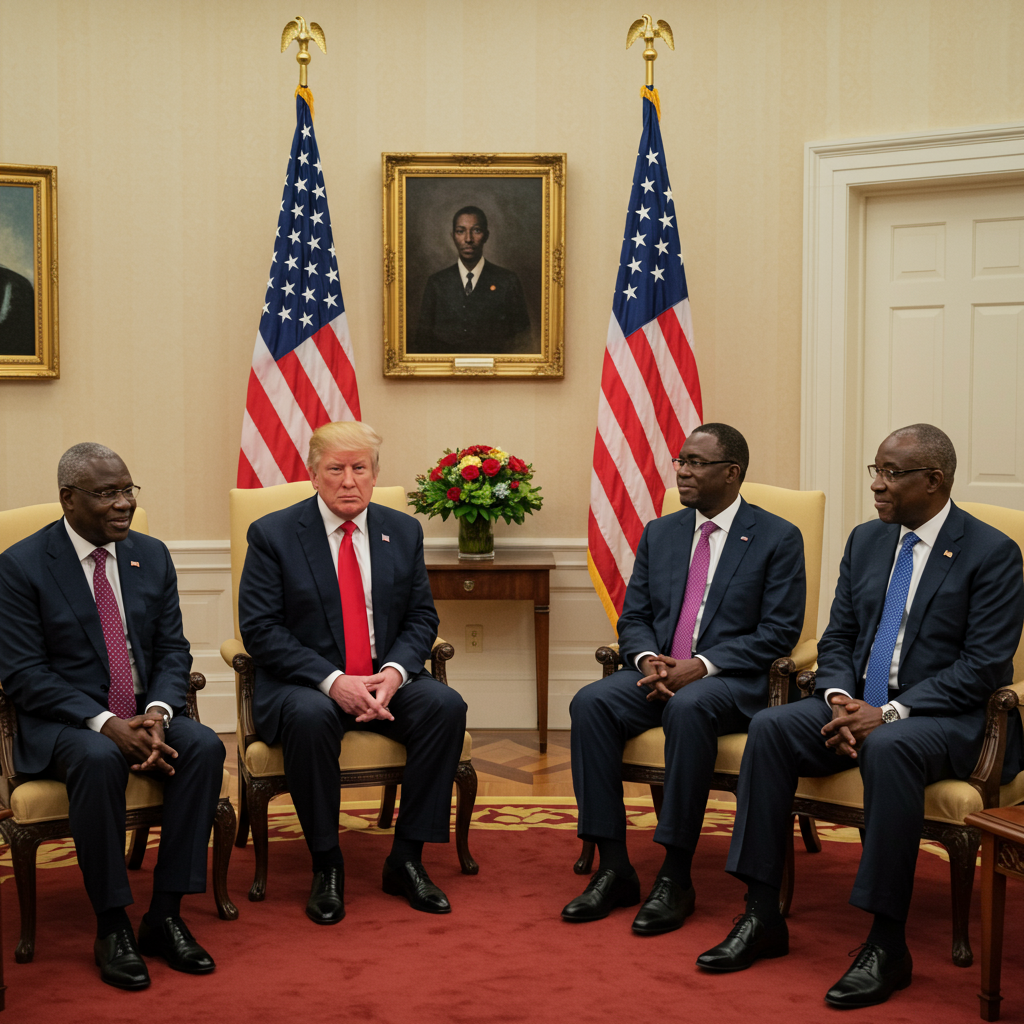A diplomatic moment at the White House recently captured global attention when U.S. President Donald Trump complimented Liberian President Joseph Boakai on his English proficiency. The seemingly innocuous remark, made during a meeting with several African heads of state, quickly sparked commentary and debate due to its specific context. President Boakai, visiting Washington D.C. for discussions on U.S.-Africa relations and economic development, found himself at the center of an exchange that highlighted potential cultural or geographical misunderstandings.
The meeting aimed to foster stronger ties between the United States and key African nations. Leaders from Senegal, Gabon, Mauritania, Guinea-Bissau, and Liberia were present, engaging in dialogue that touched upon crucial foreign policy issues, economic strategies, and even controversial topics like proposed changes to U.S. foreign aid, including potential cuts to USAID funding. This specific encounter, however, momentarily shifted the focus from policy to a more personal, and for many observers, awkward interaction.
The White House Exchange Detailed
According to reports from the event, after Liberian President Joseph Boakai delivered initial remarks expressing gratitude and discussing his nation’s long-standing friendship with the United States, President Trump responded directly to his speaking ability. Trump reportedly told President Boakai, “Well, thank you,” before adding, “And such good English, that’s beautiful.” He followed this compliment by inquiring about President Boakai’s educational background, asking, “Where did you learn to speak so beautifully?”
The conversation continued with Trump posing a more direct question about the location of President Boakai’s schooling: “Where were you educated? Where? In Liberia?” Upon confirmation that President Boakai received his education within Liberia, Trump commented, “Well, that’s very interesting. It’s beautiful English.” The U.S. President then reportedly made a comparison, stating, “I have people at this table can’t speak nearly as well.” President Boakai is said to have responded to the initial compliment and questions with a polite chuckle, choosing not to explicitly state a key fact relevant to the exchange.
Liberia’s Official Language and Historical Connection to the US
The reason President Trump’s compliment drew such significant attention and criticism is a fundamental piece of information: English is the official language of the Republic of Liberia. This fact is widely known among those familiar with the nation’s history and governance. For the leader of a country where English holds official status to be singled out and praised for speaking “such good English” struck many as peculiar, suggesting a potential lack of awareness about Liberia’s linguistic landscape.
Understanding Liberia’s history provides crucial context for this interaction. Liberia is Africa’s oldest modern republic, founded in 1822 by freed American slaves. The American Colonization Society (ACS), a group comprising both abolitionists and slaveholders, established the colony with the complex goal of resettling free Black Americans in Africa. While intended by some as a humanitarian effort, others saw it as a way to remove free Black people from American society. The nation’s capital, Monrovia, is named after U.S. President James Monroe, a supporter of the ACS effort (and notably, a slave owner himself).
Liberia declared independence in 1847, adopting a Constitution modeled after the United States. Its Declaration of Independence explicitly cited the systemic racism, violence, and inequality experienced in the U.S. as the compelling reasons necessitating their departure and the establishment of a new, sovereign nation. This unique historical bond means Liberia has deep cultural and linguistic ties to the United States, including the adoption of English as its official language for government, education, and commerce. Liberia is the second-oldest Black-led republic globally, following Haiti’s independence in 1804.
Political Backlash and White House Response
The reaction to President Trump’s comments was swift and often critical. Many observers, particularly political figures and commentators, interpreted the remarks as insensitive, ignorant, or even racially charged. The compliment, framed as surprising or noteworthy, was seen by some as implying that proficient English speaking was unexpected from an African leader, especially one from a nation where it is the official language.
Democratic Representative Jasmine Crockett from Texas publicly criticized Trump on social media platform X. She stated, “Trump never misses an opportunity to be racist and wrong, and every day he finds a new way to be embarrassing.” Crockett labeled the act of asking the Liberian President where he learned English, given its official status in his country, as “peak ignorance.” She further argued that “being blatantly offensive is not how you go about conducting diplomacy.” Prominent Trump critic and former Representative Adam Kinzinger also reacted strongly, reportedly calling Trump “Absolutely the dumbest man in govt” and the comment “ridiculous.” The incident was referenced alongside previous controversies involving Trump’s remarks about African nations, including his reported description of some countries as “shithole countries” in 2018.
In response to the criticism, the White House offered a defense of President Trump’s remarks. White House spokesperson Anna Kelly described the comments as “a heartfelt compliment.” She framed the moment as part of “a meeting that marked a historic moment for U.S.-Africa relations,” suggesting the focus should remain on the broader diplomatic engagement rather than a single exchange. This official stance aimed to downplay any negative interpretation and reinforce the administration’s positive framing of the White House meeting.
Broader Meeting Context and Policy Discussions
Beyond the specific exchange about language, the White House meeting with the five African leaders covered substantial policy ground. President Boakai had initially set a tone of friendship and alignment, reportedly expressing belief in President Trump’s policy of “making America great again” and aligning Liberia with a diplomacy approach focused on economic development and commercial partnership.
The discussions at the subsequent lunch included various topics of mutual interest, such as foreign policy approaches and strategies for economic growth. A significant point of discussion involved the U.S. administration’s decision to reduce or eliminate funding for the U.S. Agency for International Development (USAID). This policy shift, described by the White House as moving away from a “charity-based foreign aid model,” aims instead to build closer ties with nations demonstrating “the ability and willingness to help themselves.” Reports indicated concerns raised about the potential humanitarian impact of such cuts, citing studies forecasting millions of additional global deaths, many projected to occur in Africa, over the next five years if funding is significantly reduced.
The White House’s emphasis on shifting aid policy reflects a broader reorientation of U.S. engagement with developing nations under the administration. While the policy itself is a complex issue with varied perspectives, its discussion during the meeting provided a backdrop of significant, high-stakes diplomacy against which the more personal interaction regarding language proficiency unfolded.
Analysis of the Diplomatic Moment
The incident highlights several facets of international diplomacy and communication styles. For many, the comment about English proficiency from a leader of a nation where it is official felt culturally tone-deaf. It raised questions about awareness levels regarding basic facts about partner countries, particularly those with deep historical links to the U.S. Diplomacy often relies on demonstrating respect and understanding of a nation’s background, including its language and history.
Others view the comment through the lens of President Trump’s unconventional communication style. Known for often speaking off-the-cuff and using casual language, supporters might argue it was merely an informal compliment, taken out of context or overanalyzed. The White House’s framing of it as “heartfelt” aligns with this perspective, suggesting no negative intent was behind the remark.
However, the strong political backlash underscores the sensitivity surrounding such interactions, especially when they involve leaders from different cultural or racial backgrounds. Accusations of ignorance or underlying bias reflect the deep divisions and sensitivities prevalent in both domestic and international discourse. The fact that President Boakai reportedly chuckled without offering a direct explanation that English is official could be interpreted in various ways – perhaps a polite dismissal, an attempt to avoid awkwardness, or simply a response to an unexpected comment.
Ultimately, the exchange became a minor but notable diplomatic incident, illustrating how even seemingly simple compliments can carry unintended weight and spark significant reaction depending on the context, the individuals involved, and the broader political climate. It serves as a reminder of the complexities inherent in international relations and the scrutiny faced by leaders’ words and actions on the global stage.
Frequently Asked Questions
Why was President Trump’s compliment to the Liberian President about English considered awkward or notable?
President Trump’s comment to Liberian President Joseph Boakai about speaking “such good English” drew attention because English is the official language of Liberia. For the leader of a nation where English is used in government, education, and business to be complimented on speaking it well was seen by many as a sign of potential ignorance regarding basic facts about Liberia, making the exchange seem awkward or misplaced in a diplomatic context.
What is the historical connection between Liberia and the United States?
Liberia was founded in 1822 by freed American slaves and their descendants, supported by the American Colonization Society. Its capital, Monrovia, is named after U.S. President James Monroe. Liberia modeled its Constitution after the U.S. and is Africa’s oldest modern republic, having declared independence in 1847, citing U.S. racism and inequality as reasons for establishing their own nation. This history explains why English is the official language and highlights the deep, albeit complex, ties between the two countries.
How did political figures and the White House react to President Trump’s comment?
The comment elicited strong criticism from some political figures. For instance, Democratic Rep. Jasmine Crockett called it “peak ignorance” and potentially “racist,” while former Rep. Adam Kinzinger called it “ridiculous.” Critics viewed it as insensitive given Liberia’s history and language. The White House, however, defended the remark through spokesperson Anna Kelly, who described it as “a heartfelt compliment” and framed it as part of a significant meeting for U.S.-Africa relations, downplaying any negative interpretation.




